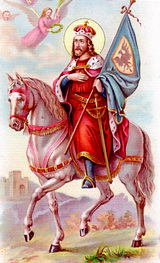Lives of the Saints
Our Models and Protectors
Spiritual Bouquet:
September 28

Saint Wenceslas
Martyr
(† 938)
Wenceslas, born towards the end of the ninth century, was the son of a Christian Duke of Bohemia, but his mother was a harsh and cruel pagan. His holy grandmother, Ludmilla, seeing the danger to the future king, asked to bring him up. Wenceslas was educated by her good offices in the true faith, and under her tutelage acquired an exceptional devotion to the Blessed Sacrament. At the death of his father, however, he was still a minor, and his mother assumed the government and passed a series of persecuting laws. In the interests of the Faith, Wenceslas, encouraged by his grandmother, claimed and obtained through the support of the people, a large portion of the country as his own kingdom. Soon afterwards his grandmother was martyred, out of hatred of her faith and services to her country, while making her thanksgiving after Holy Communion.
His mother secured the apostasy and alliance of her second son, Boleslas, who became henceforth her ally against the Christians. Wenceslas in the meantime ruled as the brave and pious king of Bohemia. When his kingdom was attacked, the prince of the invading army, which had been called in by certain seditious individuals, was approaching with a lance to slay him. This prince, named Radislas, saw two celestial spirits beside him; he had already seen him make the sign of the cross and then heard a voice saying not to strike him. These marvels so astonished him that he descended from his horse, knelt at the feet of Wenceslas and asked his pardon. Peace was then reestablished in the land.
In the service of God Saint Wenceslas was constant, planting with his own hands the wheat and pressing the grapes for Holy Mass, at which he never failed to assist each day. He provided for the poor and himself took what they needed to them at night, to spare them the shame they might incur if their poverty became public knowledge. He desired to introduce the Benedictine Order into his kingdom, but was struck down by a violent death before he could do so and himself enter a monastery, as he wished to do.
His piety provided the occasion for his death. After a banquet at his brother's palace, to which he had been treacherously invited and where he manifested great gentleness towards his brother and mother, he went to pray at night before the tabernacle, as he was accustomed to do. There, at midnight on the feast of the Angels in the year 938, he received the crown of martyrdom by the sword, at the hand of his own brother.
Reflection: Saint Wenceslas teaches us that the safest retreat amid the trials of life, or to prepare for the stroke of death, is the sanctuary of Jesus in the Blessed Sacrament.
Little Pictorial Lives of the Saints, a compilation based on Butler's Lives of the Saints and other sources, by John Gilmary Shea (Benziger Brothers: New York, 1894); Les Petits Bollandistes: Vies des Saints, by Msgr. Paul Guérin (Bloud et Barral: Paris, 1882), Vol. 11